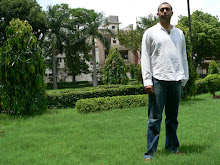Like the rest of the world, India woke up this morning agog at Obama’s victory. His speech as President-elect was relayed live on every one of the three dozen local language news channels this morning displacing the usual blizzard of crime, stock market and cricket statistics.
Rolling interviews with beaming African Americans, both voters and punters, probably meant that Indians saw more black people on their screen over breakfast than ever before.
That said the US election chatter was numbing. There were vapid interviews with Indian journalists from America, chats with Bangalore geeks reminiscing about time spent in the States and Indian psephologists attempting to draw comparisons between the world’s oldest and the largest democracies.
In a country that sees itself as the third great democratic revolution (the US and France being the first two) Obamania knows no bounds. I spoke to the foreign editor of one of India’s biggest English newspapers who could barely draw breath relaying her a near-spiritual experience of Obama’s victory at Delhi’s American centre.
There is a presumption that democracies are all built the same. India and America were both colonies and are now open societies with a free press, independent judges and rights enshrined in law. However the philosophies that underpin freedom are different in each nation. America, as the President-elect, told Chicago’s Grant Park is place where “all things are possible”.
In India this is not true. People have yet to break the boundaries of gender and social-standing in India and are unable largely to choose a life for themselves. The reality is that identity – be it caste, class, race or religion - is central to the character of India's public life. It matters where you come from and who your father was in way that Americans would find bizarre.
Democracy in India is too immature to produce a President Obama. Although the country has had a Muslim nuclear scientist as president, a Sikh economist as prime minister and a Roman Catholic woman as leader of the biggest party these are merely outcomes of patronage.
All were picked to be leaders with only Sonia Gandhi having a popular mandate to be prime minister – one she could not accept as the Hindu nationalist party threatened to campaign against her on the basis of religion. It would be like white American politicians saying they could not co-operate with President Obama because he was black.
Indians love the symbolism of Obama and many compare their impressive Dalit politician Mayawati with him. In politics symbols are important. A black man in the White house is powerful stuff – just as a Dalit woman as prime minister would be in India.
Such victories can be seen as a spur for minorities in democracies who see a conspiracy to keep them out of power. But images are themselves powerless. President Obama will not be able stop everyday racism or immediately change the appalling incarceration rate of young black men in America. Neither can Mayawati stop Dalit atrocities in the Indian state of Uttar Pradesh where she is chief minister.
What is missing from India’s coverage of Obama’s electrifying election is the acknowledgement that there are escape routes in America and there are few in India. There’s still too much emphasis placed on everyone knowing their place in India. There’s a little too much reverence for the hereditary principle. Too little importance is given to the rights of the individual. The result is that India will have to wait many years before the country can claim to have an Obama moment.
Wednesday, November 5, 2008
Subscribe to:
Post Comments (Atom)

1 comment:
'There’s a little too much reverence for the hereditary principle. Too little importance is given to the rights of the individual.'
True. I guess we'll take our own time... but we learn fast, it's just a matter of an idea taking root in India.
Post a Comment